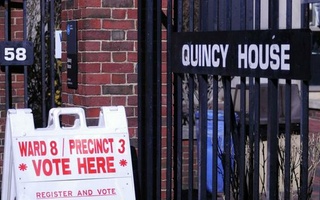As third-party political advertising comes under increased scrutiny, Harvard Law School professor Elizabeth Warren and U.S. Senator Scott Brown signed an agreement Monday in an effort to limit the role such advertisements play in the upcoming Massachusetts Senate election.
The “Peoples’ Pledge” stipulates that if a third-party group runs an advertisement promoting a particular candidate, that candidate must donate 50 percent of the advertisement’s cost to a charity of the other candidate’s choosing.
The “Pledge” gives a candidate three days to make the donation. The campaigns will be responsible for monitoring advertisements and ensuring that penalties are paid.
“People have a right to make a decision in their Senate race based on what the candidates say and what the candidates do,” Warren said at a press conference Monday after the agreement was made. “Not based on what Karl Rove and the super PACs can accomplish.”
Brown expressed a similar sentiment in a statement released Monday.
“This is a great victory for the people of Massachusetts, and a bold statement that puts super PACs and other third parties on notice that their interference in this race will not be tolerated,” Brown wrote.
The agreement—which pertains to all third-party television, radio, print, and online advertisements—follows two weeks of back and forth between the two frontrunners for the Massachusetts Senate seat.
On Friday, representatives from both campaign had been unable to settle on an agreement, with the Warren campaign arguing that the Brown camp’s proposal was not strict enough.
After tweaking the language of the proposal concerned with internet and “sham” advertising, the Warren campaign forwarded a new draft of the pledge to Brown Monday morning which he promptly signed.
The pledge is the first of its kind since the Supreme Court ruled two years ago that the government cannot restrict independent organizations’ political spending. That ruling has given rise to large, well-backed political organizations called “super PACs” which have drawn much attention this election season.
Harvard professors and Massachusetts political analysts expressed skepticism about the enforcability of the “Peoples’ Pledge.”
Laws prohibit candidates from coordinating with third-party organizations, and questions remain over whether super PACs will have any incentive to stop advertising despite the fines candidates may face.
Institute of Politics Director C.M. “Trey” Grayson ’94 said that because the agreement has garnered much publicity, the effort may be effective in the short term. But Grayson said that he expects unaffiliated groups will ramp advertising as the election draws closer.
“They can look at the agreement, and understand what the candidates are doing,” Grayson said of third-party groups. “But do they really care? They aren’t on the ballot box.”
The candidates have sent co-signed letters to third-party groups asking them to cease all advertising on behalf of the candidates. Letters were also sent to local television and radio broadcasters requesting that they refuse to accept any advertisements from third-party groups pertaining to the race.
“You can ask them not to. You can say it’s going to hurt the people you’re trying to help,” Warren said. “Ultimately I don’t kid myself about this. The law is what the law is following Citizens United and these groups legally can come in and play their dirty tricks and try to do everything they can to shape this race.”
—Staff writer Nicholas P. Fandos can be reached at nicholasfandos@college.harvard.edu.
Read more in News
Occupy Movement Spreads to University of Massachusetts BostonRecommended Articles
-
UC Announces 43 New RepresentativesThe Undergraduate Council announced the results of its general election last night, confirming the selection of 43 members for the 2010-2011 term. With 112 candidates competing, this year’s election was the most competitive in recent years, according to UC President Johnny F. Bowman ’11.
-
Major Realignment A-BrewinThough the chance of this brewing realignment to affect the 2012 election may have passed, don’t be surprised if a party with the last name like Bloomberg or Huntsman or Petraeus starts to shake up the red and blue on a map sometime in the not-too-distant future.
-
UC Elects 43 New MembersThe results of the Undergraduate Council General Election, announced Friday night, reveal an increase in female representation and the faltering of the newly formed Crimson Coalition.
-
 What You Need To Know For Election Day
What You Need To Know For Election Day -
Boston to Vote for Candidates to Advance in General Mayoral ElectionToday marks the first time in 20 years that Boston will vote on a mayoral ballot that does not include so-called "Mayor for Life" Thomas M. Menino. Instead, Bostonians will choose two of 12 candidates in the open preliminary elections to advance to a general election on Nov. 5.
-
 Town and Gown
Town and Gown













